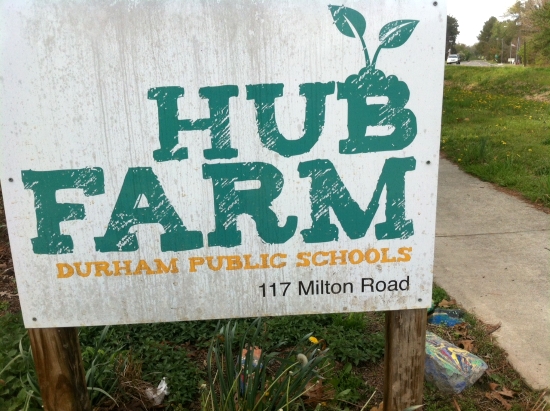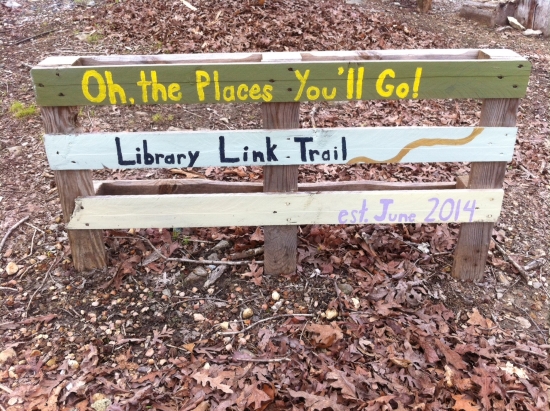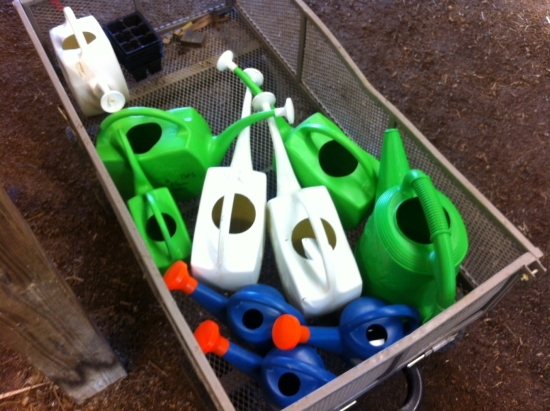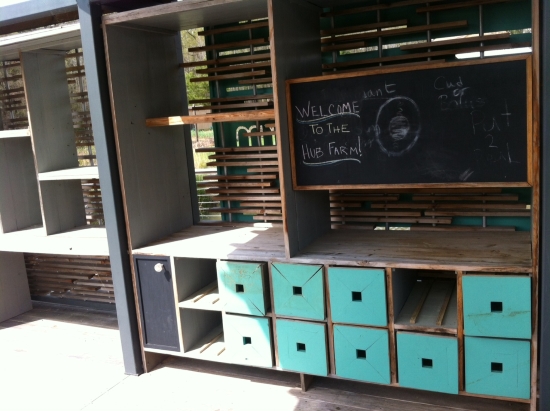by Laura Fieselman
April 14, 2015
It’s a balmy Friday afternoon at 2:30. There’s a rooster crowing, a nest of baby bunnies in the strawberry patch, and apple trees and school buses in the distance. The outdoor education students studying orienteering have just left.

This is the Hub Farm of Durham Public Schools, a 30-acre school-system farm and network of wooded trails. Here, students, teachers, and the community grow and eat healthful food, explore nature, and engage in experiential learning about food systems and natural science.
My tour with Hub Farm educator Becca Wait started with the baby bunnies (!) and included the kale, collards, and Chinese cabbage maturing in the garden planted by fifth graders. Also in the production garden are spring veggies and herbs just beginning to sprout, including carrots, cilantro, scallions, radishes, peas, turnips, and plenty of salad mix. She showed me the beehives that a volunteer maintains, the pollinator beds, and an experimental hugelkultur bed—a German planting technique that proves useful in dry Southern summers. Wait showed me the new children’s play garden—soon to be complete with a bug hotel, water works, and worm bin. We visited the chickens, toured the mini-greenhouse, and admired the barn, a structure built in the 1970s by high-school students in a local agricultural science program.

This farm has its roots with those students, who raised tilapia in the pond and sheep in the fields. Forty years later, farm-to-school thrives here, with regular student visits from the adjacent elementary school along with field trips from many of Durham’s public schools.

The farm serves the community, too. The adjacent public library recently hosted a star-gazing event here, students from North Carolina State University’s architecture program designed and built a floating lab on the pond, and camps meet here during the summer. School nutrition educators use the harvests, and some crops are sold through community supported agriculture shares and to a local café. Blue herons and beavers nest near the pond, and turtles live on site.

And yet, this farm faces challenges. Though it is close to many Durham schools, transporting students to and from the site takes time and money. And the Hub Farm must address the fact that schools are beginning to tend gardens directly on school grounds, like this one at Northern High School profiled by the News & Observer in April 2015, which can pull attention away from this off-site location.
Additionally, making time for farm education among competing curricular requirements can be difficult for teachers, and facilitating the consumption of produce grown on the farm in school cafeterias poses logistical challenges.

None of this deters the Hub Farm from forging ahead, though. As staff, including Katherine Gill, the Hub Farm project manager, Wait and two other farmers, and Rick Sheldahl, director of Durham Public Schools Career and Technical Services, work through these problems in Durham, school districts across the country join them in asking similar questions and finding parallel solutions.

And Wait and the farm team keep dreaming. They talk about expanding the project, including building out a kitchen and increasing their capacity to host events. Stay tuned, says Wait.
We’re lucky to have this resource in Durham!
…………………………………
RESOURCES
117 Milton Rd
Hub Farm of Durham
Garden’s Grow at Northern High by Jim Wise, News & Observer, April 30, 2015
…………………………………
Laura Fieselman is a writer and educator who lives in Chapel Hill, NC.



Leave a Reply